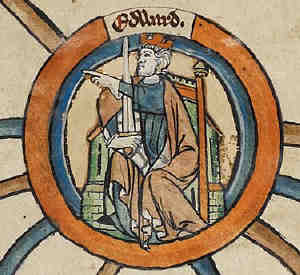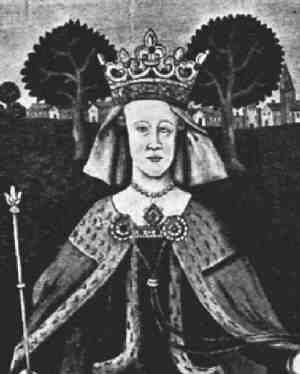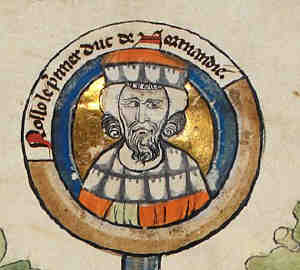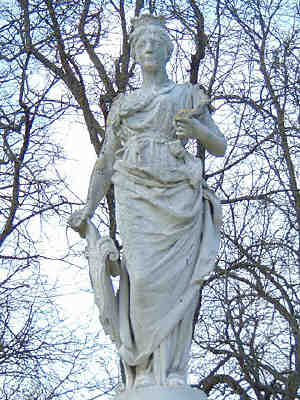 34th Generation
34th Generation 
 34th Generation
34th Generation 
8657166352. Donald II Domnall mac Causantín King of Picts / King of Scots (Alba), son of Constantine I Causantín mac Cináeda King of Picts, died in 900 and was buried in Iona.
General Notes: Domnall mac Causantín (Modern Gaelic: Dòmhnall mac Chòiseim, anglicised as Donald II (died 900), was King of the Picts or King of Alba in the late 9th century. He was the son of Constantine I (Causantín mac Cináeda). Donald is given the epithet Dásachtach, "the Madman", by the Prophecy of Berchán.
Donald married someone.
His child was:
4328583176 i. Malcolm I Cináed mac Maíl Coluim King of Scots (Alba) (born on 5 Oct 897 in Auchencairn, Kirkcudbrightshire, Scotland - died on 3 Dec 954 in Scotland)

8657166400. Edward the Elder King of the Anglo-Saxons, son of Alfred the Great King of the West-Saxons and Ealhswith, was born circa 874, died in 924 in Farndon, Cheshire, Mercia about age 50, and was buried in New Minster, Winchester, England.
General Notes: Edward the Elder (c. 874 \endash 17 July 924) was King of the Anglo-Saxons from 899 until his death in 924. He was the elder son of Alfred the Great and his wife Ealhswith. When Edward succeeded to the throne, he had to defeat a challenge from his cousin Æthelwold, who had a strong claim to the throne as the son of Alfred's elder brother and predecessor, Æthelred I.
Alfred had succeeded Æthelred as king of Wessex in 871, and almost faced defeat against the Danish Vikings until his decisive victory at the Battle of Edington in 878. After the battle, the Vikings still ruled Northumbria, East Anglia and eastern Mercia, leaving only Wessex and western Mercia under Anglo-Saxon control. In the early 880s Æthelred, Lord of the Mercians, the ruler of western Mercia, accepted Alfred's lordship and married his daughter Æthelflæd, and around 886 Alfred adopted the new title King of the Anglo-Saxons as the ruler of all Anglo-Saxons not subject to Danish rule. Edward inherited the new title when Alfred died in 899.
In 910 a Mercian and West Saxon army inflicted a decisive defeat on an invading Northumbrian army, ending the threat from the northern Vikings. In the 910s, Edward conquered Viking-ruled southern England in partnership with his sister Æthelflæd, who had succeeded as Lady of the Mercians following the death of her husband in 911. Historians dispute how far Mercia was dominated by Wessex during this period, and after Æthelflæd's death in June 918, her daughter Ælfwynn briefly became second Lady of the Mercians, but in December Edward took her into Wessex and imposed direct rule on Mercia. By the end of the 910s he ruled Wessex, Mercia and East Anglia, and only Northumbria remained under Viking rule. In 924 he faced a Mercian and Welsh revolt at Chester, and after putting it down he died at Farndon in Cheshire on 17 July 924. He was succeeded by his eldest son, Æthelstan. Edward's two youngest sons later reigned as kings Edmund I and Eadred.
Edward was admired by medieval chroniclers, and in the view of William of Malmesbury, he was "much inferior to his father in the cultivation of letters" but "incomparably more glorious in the power of his rule". He was largely ignored by modern historians until the 1990s, and Nick Higham described him as "perhaps the most neglected of English kings", partly because few primary sources for his reign survive. His reputation rose in the late twentieth century and he is now seen as destroying the power of the Vikings in southern England while laying the foundations for a south-centred united English kingdom.
Edward married Eadgifu "Ediva" of Kent circa 919.
The child from this marriage was:
4328583200 i. King Edmund I House of Wessex (born circa 920 - died on 26 May 946 in Pucklechurch, Gloucestershire, England)

8657166401. Eadgifu "Ediva" of Kent, daughter of Sigehelm Ealdorman of Kent.
General Notes: Eadgifu of Kent (also Edgiva or Ediva) (in or before 903 \endash in or after 966) was the third wife of Edward the Elder, King of Wessex.
Eadgifu was the daughter of Sigehelm, Ealdorman of Kent, who died at the Battle of the Holme in 902.[1] She married Edward in about 919 and became the mother of two sons, Edmund I of England, later King Edmund I, and Eadred of England, later King Eadred, and two daughters, Saint Eadburh of Winchester and Eadgifu.[2] She survived Edward by many years, dying in the reign of her grandson Edgar.
According to a narrative written in the early 960s, her father had given Cooling in Kent to a man called Goda as security for a loan. She claimed that her father had repaid the loan and left the land to her, but Goda denied receiving payment and refused to surrender the land. She got possession of Cooling six years after her father's death, when her friends persuaded King Edward to threaten to dispossess Goda of his property unless he gave up the estate. Edward later declared Goda's lands forfeit and gave the charters to Eadgifu, but she returned most of the estates to Goda, although retained the charters. Some time after this her marriage to Edward took place. After his death King Æthelstan required Eadgifu to return the charters to Goda, perhaps because the king was on bad terms with his stepmother.[3]
She disappeared from court during the reign of her step-son, King Æthelstan, but she was prominent and influential during the reign of her two sons and attested many of their charters.[2] In charter S 562 in 953, a grant to her by Eadred of land at Felpham in Sussex, she is described as famula Dei, suggesting that she may have taken religious vows while continuing to live on her own estates.[4]
Following the death of her younger son Eadred in 955, she was deprived of her lands by her eldest grandson, King Eadwig, perhaps because she took the side of his younger brother, Edgar, in the struggle between them. When Edgar succeeded on Eadwig's death in 959 she recovered some lands and received generous gifts from her grandson, but she never returned to her prominent position at court. She is last recorded as a witness to a charter in 966.[2]
She was known as a supporter of saintly churchmen and a benefactor of churches.
Source - Wikipedia - Queen Ediva
Eadgifu married Edward the Elder King of the Anglo-Saxons circa 919. Edward was born circa 874, died in 924 in Farndon, Cheshire, Mercia about age 50, and was buried in New Minster, Winchester, England.
8657166403. Wynflaed .
General Notes: An Anglo-Saxon Noblewoman who was a major landowner in the areas of Hampshire, Somerset, Dorset and Wiltshire in England.
Wynflaed married someone.
Her child was:
4328583201 i. Saint Ælfgifu of Shaftesbury (died in 944, buried in Shaftesbury Abbey, Dorset, England)

8657166560. Rollo "The Viking" Count of Rouen was born circa 840 in Scandinavia and died circa 930 in Normandy, France about age 90.
General Notes: Rollo (Norman: Rou, Rolloun; Old Norse: Hrólfr; French: Rollon; died between 928 and 933) was a Viking who became the first ruler of Normandy, today a region in northern France. He emerged as the outstanding warrior among the Norsemen who had secured a permanent foothold on Frankish soil in the valley of the lower Seine. After the Siege of Chartres in 911, Charles the Simple, the king of West Francia, granted them lands between the mouth of the Seine and what is now Rouen in exchange for Rollo agreeing to end his brigandage, swearing allegiance to him, religious conversion and a pledge to defend the Seine's estuary from Viking raiders.[4][5]
The name Rollo is first recorded as the leader of these Viking settlers in a charter of 918, and he continued to reign over the region of Normandy until at least 928. He was succeeded by his son William Longsword in the Duchy of Normandy that he had founded.[6] The offspring of Rollo and his followers, through their intermingling with the indigenous Frankish and Gallo-Roman population of the lands they settled, became known as the "Normans". After the Norman conquest of England and their conquest of southern Italy and Sicily over the following two centuries, their descendants came to rule England, much of Ireland, Sicily and Antioch from the 11th to 13th centuries, leaving behind an enduring legacy in the histories of Europe and the Near East.
Source - Wikipedia - Rollo "The Viking"
• MONUMENT: Statue of Rollo in Ålesund, Norway.
Rollo married Poppa of Bayeux. Poppa was born circa 880 in Bayeux, Normandy, France.
The child from this marriage was:
4328583280 i. William LONGSWORD Count of Rouen (born circa 893 in Bayeux, Normandy, France - died on 17 Dec 942, buried in Rouen Cathedral, Rouen, Normandy, France)

8657166561. Poppa of Bayeux, daughter of Berengar II of Neustria and Adela of Vermandois, was born circa 880 in Bayeux, Normandy, France.
Poppa married Rollo "The Viking" Count of Rouen. Rollo was born circa 840 in Scandinavia and died circa 930 in Normandy, France about age 90.
![]()
Home | Table of Contents | Surnames | Name List
This website was created 28 Jul 2022 with Legacy 9.0, a division of MyHeritage.com; content copyrighted and maintained by family@garypatton.net